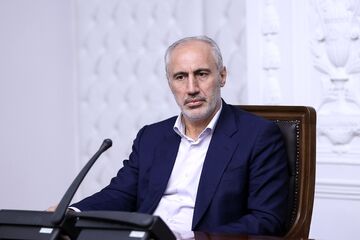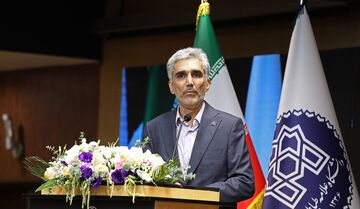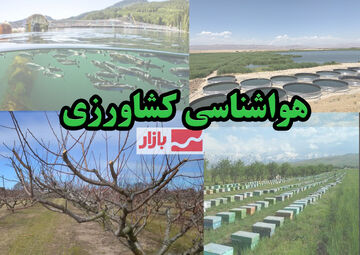TEHRAN(Bazzar) - Polina Aniftou, a Ph.D. candidate of Iranian foreign policy, says “Cyprus shares a long history of good relations with Iran, including bilateral agreements dating decades back on promoting and protecting investments, merchant shipping, medical science, tourism, education and culture.”
Founder of the House of Iran adds “The House of Iran is specialized in technology, real estate, funds, tourism, education, visa arrangements for students and universities promotion, financial markets, construction and energy and our target is to work inside and outside Iran.”
Following is the full text of the interview:
Bazzar: What is your assessment of the volume of trade relations between Iran and Cyprus and what potentials do the two countries have in terms of expanding trade?
Aniftou: Cyprus shares a long history of good relations with Iran, including bilateral agreements dating decades back on promoting and protecting investments, merchant shipping, medical science, tourism, education and culture. In September 2014, new momentum was injected into the business connection between the two countries when the Chambers of Commerce of Iran and Cyprus signed a Memorandum of Cooperation. Two landmark events of August 2015 aimed to boost trade and cooperation between the two countries were the establishment of The Cyprus-Iranian Business Association with 75 enterprises having signed up as members, and the signing of an Agreement on the Avoidance of Double Taxation and Fiscal Evasion, along with accompanying protocol, based on the OECD Model Tax Convention framework. On January 16 2016 the European Union implemented the Joint Comprehensive Plan of Action, which scaled back sanctions on Iran and marked the country's return to international capital (and other) markets. After the withdrawal of USA and the implementation of sanctions the business transactions between the two countries were limited and the Cyprus-Iranian Business Association is not active the last one year.
In recent years, around 6,000 Iranians have been visiting Cyprus every year. However, following the bi-lateral cultural & trade agreement between Cyprus and Iran early in 2009, the Cyprus Tourism Minister Mr Paschalides announced plans to boost the annual number to 20,000. Although no timescale has been quoted, a 5-8 year period seems reasonable. As part of the bilateral cultural & trade agreement, it was announced that special visas and resident permits in Cyprus would be created for wealthier Iranians who wished to buy a property in Cyprus ( for at least 300,000 Euro) and who could prove more than a minimum level of regular income coming from Iran. Although not entirely new, this scheme is postponed at the moment for an undefined period.
Bazzar: One of the most important economic sectors in Cyprus is the financial services sector, the tourism industry, and real estate activities. In the financial services sector of industries, sectors such as trade, foundations, foreign trade, banking, trade finance, insurance and budget management have been able to grow well. The profitability of joint stock companies and the formation of companies has caused many companies to move to this country and send their capital to trade in the markets of Cyprus through this country. In terms of financial services, what attractions can Cyprus have for Iranian companies?
Aniftou: Iran is a long way from Cyprus yet there are longstanding connections and affinities between the two countries. Few people in Cyprus perhaps realize that Cyprus was at various times part of the ancient Persian Empires. Several Iranian businessmen have told me that investment opportunities in Cyprus are big not only in real estate, but also in funds and in corporate management. The House of Iran that is launching within the next weeks and it has as a priority to offer to Iranian businesses and start-ups a corporate environment to meet business and projects in Cyprus, Greece, Europe and worldwide. The services to be offered is that the House of Iran will open offices in Cyprus for the Iranian companies that can meet clients out of Iran, PO BOX in Europe, work as a nominee and representative for Iranian companies worldwide and search for potential clients in all the industries. Thus, the financial sector in Cyprus is very strong and has business and transaction channels around the globe, and the country is a financial center for Middle East and Europe with a lot of foreign residents and activities.
On August 4 2015 Cyprus and Iran signed a tax treaty for the avoidance of double tax, which came into force on January 1 2016 in Cyprus and in March 2016 in Iran. The treaty complies with the form of the Organisation for Economic Cooperation and Development (OECD) Model Convention for the Avoidance of Double Taxation on Income and Capital. The key provisions are as follows:
•Capital gains tax arises only in the country of tax residency of the person making the disposal (with the exception of real estate). On this basis, a Cyprus investor should not be subject to Iranian capital gains taxes;
•Dividend payments to a Cyprus company from Iran are subject to a maximum withholding tax rate of 10%, which may be reduced to 5% in the event that the Cyprus company holds at least 25% of the underlying Iranian company's capital;
•Interest paid to a Cyprus company by an Iranian entity is subject to a maximum withholding tax rate of 5%;
•Royalties paid to a Cyprus investor are subject to a maximum withholding tax rate in Iran of 6%; and
•The risk of double tax on income is reduced through the OECD's 'credit method', whereby credit is given by the Cyprus tax authorities to a Cyprus tax resident in respect of any Iranian income tax paid by the Cyprus tax resident.
In terms that Iran is returning to the market, to my personal opinion in the next 2 years, Cyprus could be the path in order Iranian companies to be established under a European jurisdiction with tax flexibilities. The House of Iran will be able to host the Iranian business and advise on corporate and trade issues.
Bazzar: Cyprus has a large port for trade and transit of goods called "Limassol". The presence of this port and the intercontinental position of Cyprus have led to a significant increase in many businesses related to trade. Iran has maintained its shipping lines in this port in trade with Cyprus. What is the importance of this port for Iran's trade relations?
Aniftou: The geographical proximity of Cyprus to Iran should not be understated as a relevant consideration to any structuring decision. Direct flights from Larnaca, Cyprus to Tehran take less than two hours and Cyprus time is only one-and-a-half hours behind Tehran time. This compares favourably to international centres based in Western Europe. Limassol is the biggest port of Cyprus and has international convenient routes across Mediterranean and a gross warehouse for sipping industry. As an EU member state, a company operates from Cyprus port is subject to and may take advantage of the acquis communautaire (the EU body of law). This means that Cyprus-based financial institutions and shipping trade between the two countries may structure investments and business operations using the European Union's harmonized framework for pan-European investment under the EU single market, but also in banking and insurance of trade and financial industry.
Bazzar: More than 70% of Cyprus' s revenue comes from the service sector. The most important of these sectors can be considered services related to tourism, real estate as well as financial services. You are also active in this field. In this regard, explain what your activities in this field have been to expand relations between the two countries and what measures do you plan to expand it?
Aniftou: Cyprus is the only common law jurisdiction that benefits from the terms of a bilateral investment treaty (BIT) with Iran which was signed on March 2 2009 and came into force on April 18 2009. Cyprus ha sthe same legal system as UK, Australia and Canada as common law countries. The BIT establishes the cooperation of the two countries over FDI and provides a solid base on which Cypriot investors and other foreign investors using a Cyprus company can build their investment in Iran. The BIT guarantees investors from and investing into Iran equal treatment and access to fair recourse, as well as confirmation that investments will be protected and required licenses will be granted if these duly comply with applicable law.
Cyprus exports to Iran was US$9.29 Million during 2019, according to the United Nations COMTRADE database on international trade. Cyprus imports from Iran was US$560.81 Thousand during 2019, according to the United Nations COMTRADE database on international trade. Around 6.000 Iranians used to visit the island every year and many still study at the universities in Cyprus and this is most encouraged by the Ministry of Education of Cyprus. Cypriots visiting Iran are due to non- good promotion of Iran in Cyprus and the agencies and flights collaboration, as the direct flights between the two countries cancelled a few years ago.
The House of Iran is specialized in technology, real estate, funds, tourism, education, visa arrangements for students and universities promotion, financial markets, construction and energy and our target is to work inside and outside Iran, and we offer the following services to help the business between the two countries;
1) Assisting Iranian companies, state institutions, individuals for business transitions within and outside Iran,
2) Working with international companies and groups in Europe and globally,
3) The opening of the House of Iran that will deal with the Iranian culture, heritage, Iranian start- ups and innovation between Cyprus and Iran.
5. The main products imported to Cyprus include: chemicals, vehicles, hydrocarbons, machinery and iron and steel. Cyprus's economy is dependent on energy imports and imports are in surplus compared to the service sector. Iran is also active in this field, but it seems that Iran does not have a good position in these sectors. Cyprus is also a good market for Iranian agricultural products. What steps should be taken in this regard to expand relations?
This is an excellent question because Cyprus has a difficulty in finding providers into these industries, and recently tried to find products through Lebanon. Certainly the Business Association between the two countries needs to revive and sign a Memorandum for exchanging experience, Cypriots to visit Iran for educational purposes on energy and Iranians to visit or employ in Cyprus. The knowledge and the experience in these industries is something that the Cyprus economy is lacking and Iran could be one of the main providers into that. Also shipping companies, banking facilities and political collaboration is needed in order Cyprus to be advanced and helped into this sector.
Bazzar: One of the important fields in expanding the relations between the two countries is tourism. Iran and Cyprus are two tourist countries. One of the reasons that the number of Cypriot tourists to Iran is low is their lack of awareness of the stable situation in Iran. It seems that by expanding cultural relations such as scientific and academic visits, this wrong mentality can be corrected and help in choosing Iran as a tourist destination. What is your opinion?
Aniftou: Cypriots are less adventurous on their holidays and Iran has not promoted constantly through the tourist agencies. Cypriots mostly travel to Greece, to UK, Europe and more exotic countries but not often. The media propaganda has affected the relations between the two countries and though Cyprus is part of Middle East the people do not have sufficient knowledge about Iran. The House of Iran will have photos, cultural exhibition, products in order Cypriots to meet Iran and get familiar with the Iranian culture, that I have to say is not alien to Cyprus culture and way of life. I mean we eat similar products, we enjoy visiting the city for coffee and tea, we are family oriented, we are both countries religious and we should one day make a conference to prove the similarities between Orthodox Christians and Shiism that they know each other since Byzantine times.
Bazzar: What is the House of Iran, and what is its goals?
Aniftou: The House of Iran is located in Paphos in Cyprus with future expansion to Luxembourg. The entity established in strategy, corporate services, Marketing, Communications and legal sectors launching opportunities in the local and global industry. Our company provides an opportunity to contribute to business most important endeavors; to develop excellent professional opportunities for representation of companies in Europe and globally and focus on the development of innovative corporate services and products such as Law, Accounting, Business Administration, Management, Banking, Marketing, Investment analysis, political sciences, geopolitical studies, war studies, Public Relations, Communications, business strategy, culture & heritage studies, secretarial services, companies incorporation, funds registration, wealth management, immigration, universities & career studies, Regulatory and Compliance Services, macroeconomic studies, political & economic banking studies.
We are then looking to practice the following services to Iranian companies;
•All companies will be represented and a data base will be introduced to the European and global market.
•Contests and competitions to be organized for the best idea between Cypriots and Iranian entrepreneurs.
•Preparation of pocket book for Iran given to preliminary kids visitors.
•Promotion of travel ling to visit start- up companies.
•Career orientation to universities.
•Preparation of quarterly newsletter for culture & business to be sent to companies globally.
•Instagram/ Facebook page of the House.
•The House will be opened to try traditional products.
















نظر شما